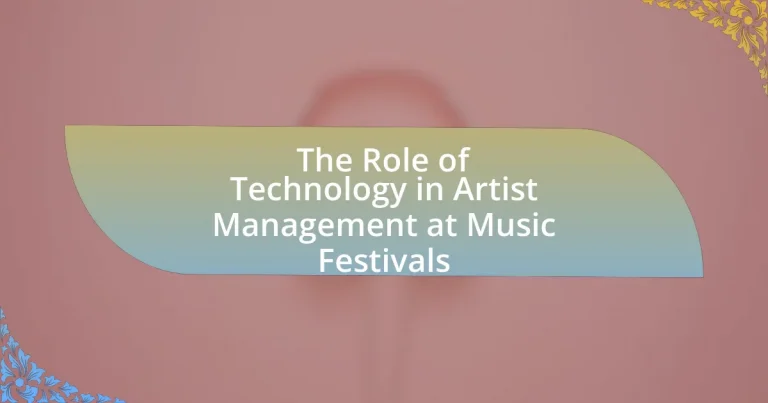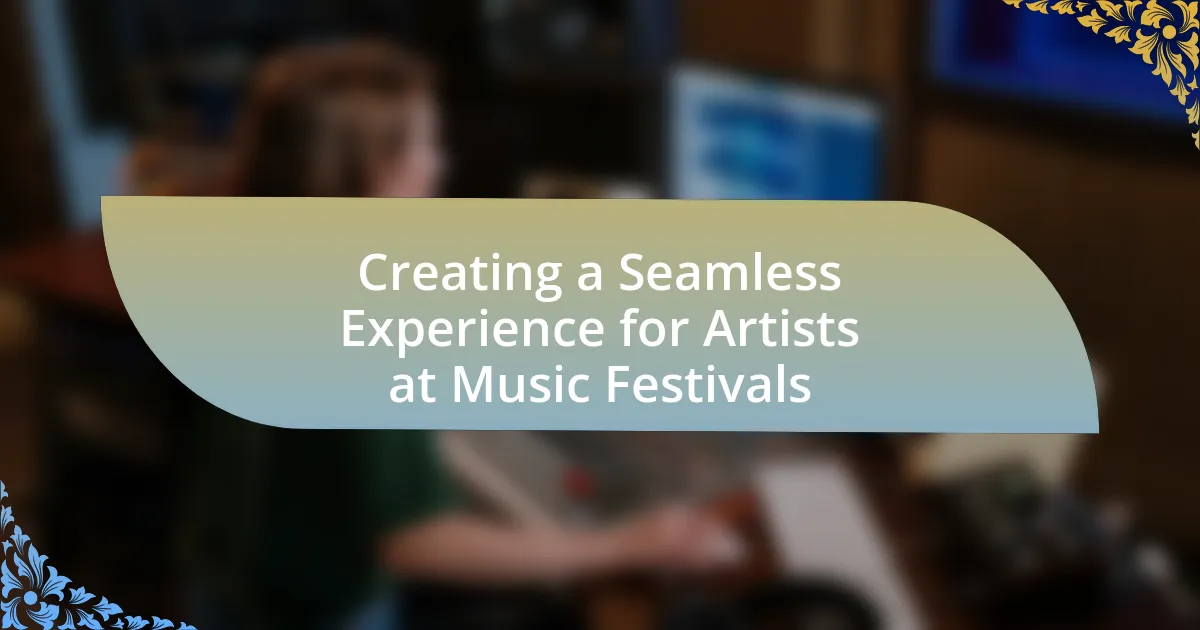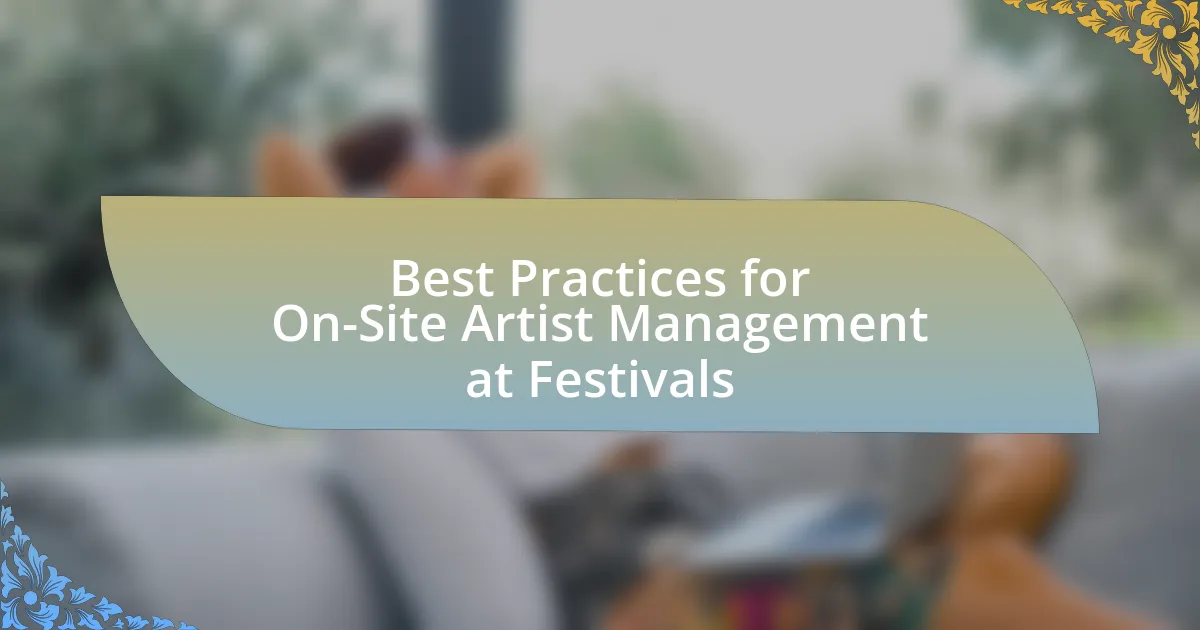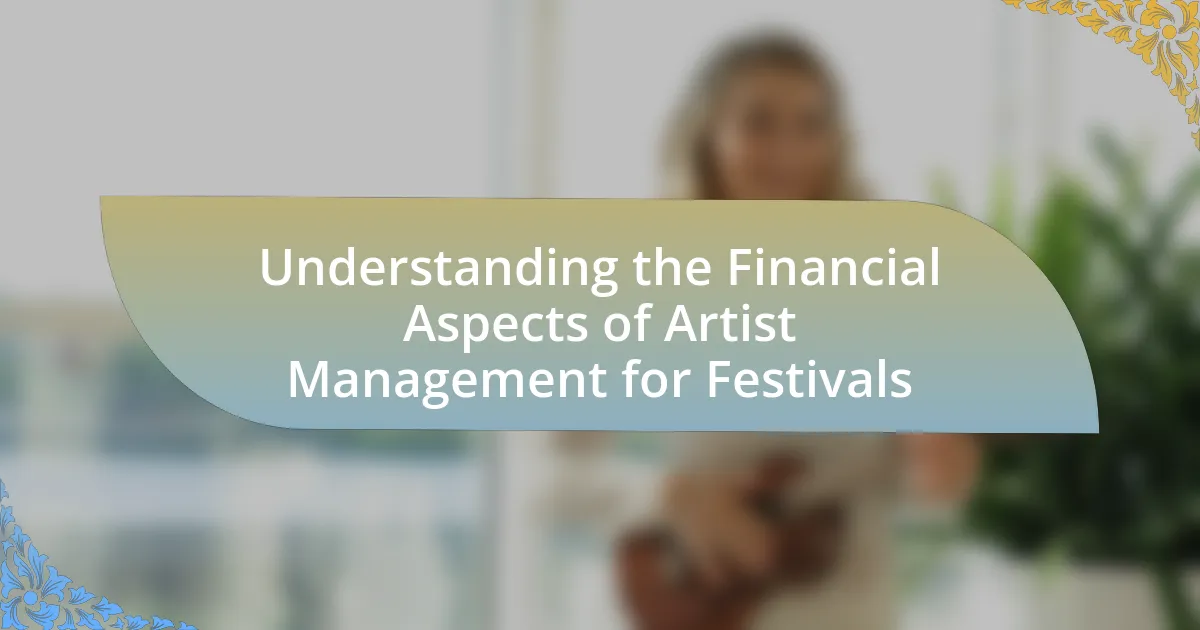The article focuses on the critical role of technology in artist management at music festivals. It highlights how various technological tools, such as management software, data analytics, and social media platforms, streamline communication, enhance logistical coordination, and improve audience engagement. Key benefits include real-time updates on schedules, tailored marketing strategies based on audience data, and improved interaction between artists and fans. Additionally, the article addresses challenges faced by artists and managers, such as technical failures and privacy concerns, while outlining best practices for effective technology use in the festival environment.
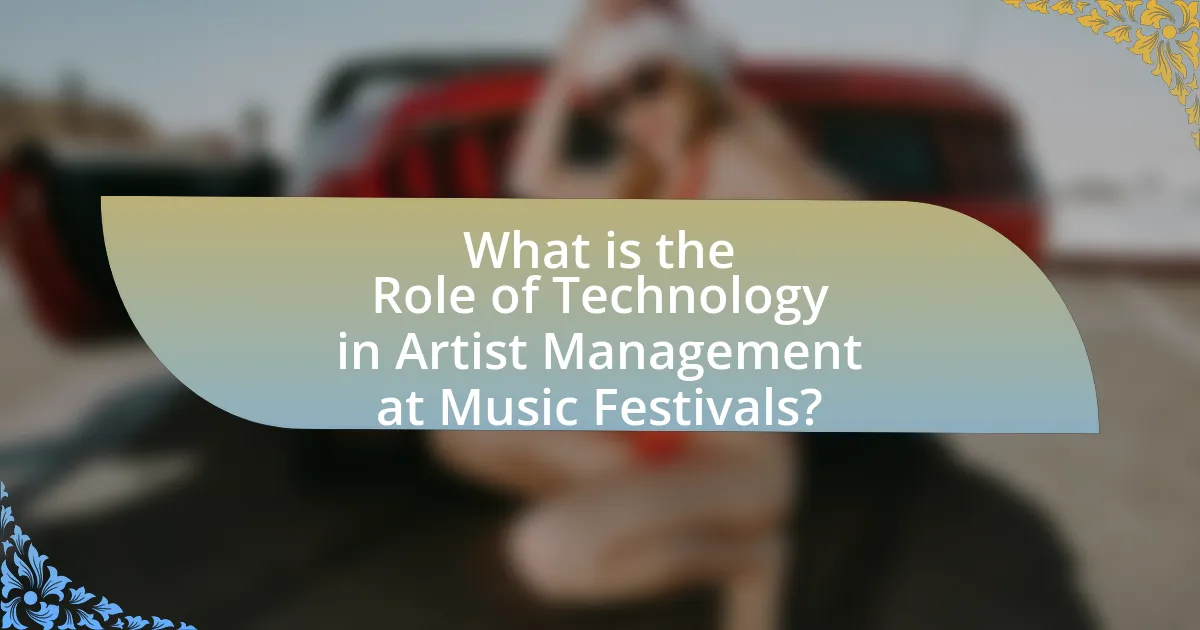
What is the Role of Technology in Artist Management at Music Festivals?
Technology plays a crucial role in artist management at music festivals by streamlining communication, enhancing logistics, and improving audience engagement. For instance, management software allows for real-time updates on schedules, set times, and artist requirements, ensuring that all parties are informed and coordinated. Additionally, data analytics tools help managers assess audience preferences and behaviors, enabling tailored marketing strategies that can increase ticket sales and enhance the festival experience. Furthermore, social media platforms facilitate direct interaction between artists and fans, fostering a stronger connection and promoting the event effectively. These technological advancements not only optimize operational efficiency but also contribute to a more engaging and successful festival environment.
How has technology transformed artist management in the context of music festivals?
Technology has significantly transformed artist management in the context of music festivals by streamlining communication, enhancing data analytics, and improving logistical coordination. Digital platforms enable real-time communication between artists, managers, and festival organizers, facilitating quick decision-making and problem-solving. Advanced data analytics tools allow managers to assess audience preferences and optimize artist lineups based on historical performance data, leading to increased ticket sales and audience satisfaction. Additionally, technology has improved logistical aspects such as scheduling, transportation, and accommodations through dedicated software solutions, ensuring that artists’ needs are met efficiently. For instance, the use of apps like Artist Growth helps managers track finances and schedules, demonstrating how technology enhances operational efficiency in artist management at festivals.
What specific technologies are utilized in artist management at music festivals?
Artist management at music festivals utilizes technologies such as artist management software, mobile applications, and data analytics tools. Artist management software, like Artist Growth and Gigwell, streamlines scheduling, contracts, and communication, enhancing efficiency in managing multiple artists. Mobile applications facilitate real-time updates and communication between artists and management teams, ensuring smooth operations during the festival. Data analytics tools analyze audience engagement and performance metrics, allowing managers to make informed decisions regarding artist bookings and marketing strategies. These technologies collectively improve coordination, enhance artist experience, and optimize festival operations.
How do these technologies enhance communication between artists and management?
Technologies enhance communication between artists and management by providing real-time updates and streamlined information sharing. Tools such as mobile apps and cloud-based platforms facilitate instant messaging, scheduling, and document sharing, ensuring that both parties remain aligned on performance details, logistics, and contractual obligations. For instance, platforms like Slack and Trello allow for organized communication channels, reducing misunderstandings and improving efficiency. Additionally, data analytics tools enable management to track artist preferences and feedback, fostering a more responsive and tailored communication approach. This integration of technology ultimately leads to a more cohesive working relationship, as evidenced by the increased satisfaction rates reported in artist management surveys conducted by organizations like the International Music Managers Forum.
What are the key benefits of integrating technology into artist management at music festivals?
Integrating technology into artist management at music festivals enhances efficiency, communication, and audience engagement. Technology streamlines scheduling and logistics, allowing for real-time updates and coordination among artists, managers, and festival organizers. For instance, platforms like Artist Growth provide tools for managing tour schedules and financials, which can lead to reduced operational costs and improved artist satisfaction. Additionally, technology facilitates better communication through apps and social media, enabling artists to connect with fans and promote their performances effectively. According to a report by Eventbrite, 75% of festival-goers prefer using mobile apps for event information, highlighting the importance of technology in enhancing the overall festival experience.
How does technology improve logistical planning for artists?
Technology enhances logistical planning for artists by streamlining communication, optimizing scheduling, and improving resource management. Digital platforms enable real-time updates and coordination among team members, ensuring that artists receive timely information about performance schedules, venue details, and travel arrangements. For instance, tools like project management software and mobile apps facilitate efficient task assignments and tracking, which reduces the likelihood of miscommunication. Additionally, data analytics can forecast potential logistical challenges, allowing for proactive adjustments. According to a study by Eventbrite, 70% of event organizers reported that technology significantly improved their planning processes, demonstrating its effectiveness in enhancing logistical efficiency for artists.
What impact does technology have on artist promotion and audience engagement?
Technology significantly enhances artist promotion and audience engagement by providing platforms for direct interaction and targeted marketing. Social media channels, such as Instagram and TikTok, allow artists to reach wider audiences instantly, with statistics showing that 54% of users on these platforms discover new music through social media. Additionally, streaming services like Spotify and Apple Music utilize algorithms to personalize recommendations, increasing listener engagement and promoting artists effectively. Data analytics tools enable artists and managers to track audience preferences and behaviors, allowing for tailored promotional strategies that resonate with specific demographics. This integration of technology not only amplifies visibility but also fosters a more interactive relationship between artists and their fans, leading to increased loyalty and attendance at live events.
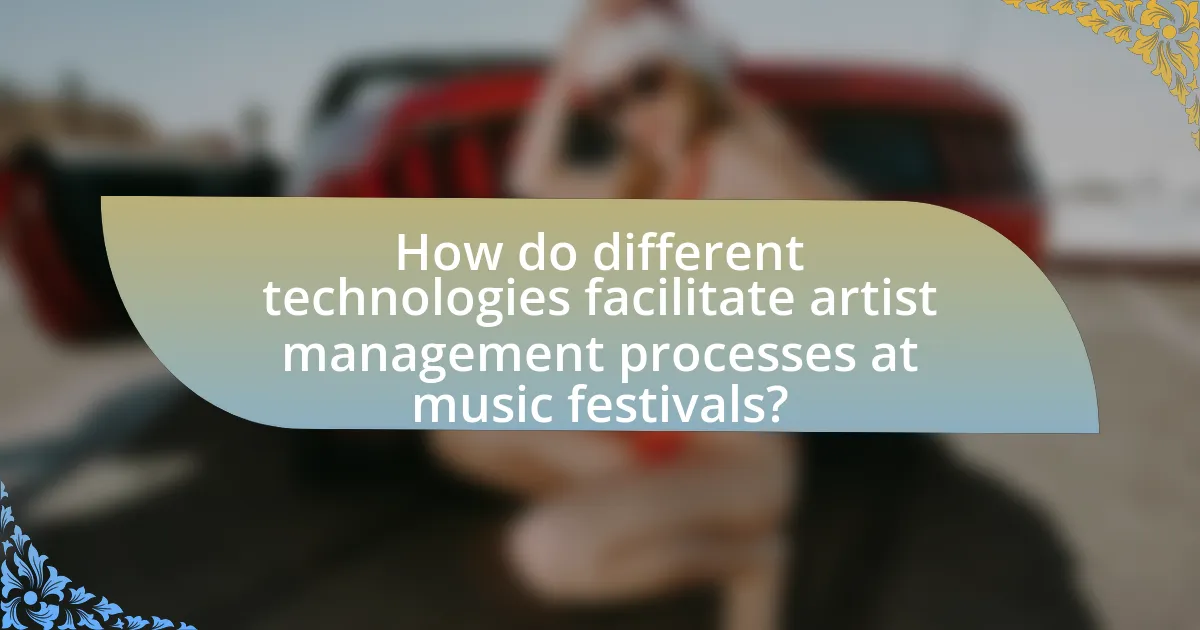
How do different technologies facilitate artist management processes at music festivals?
Different technologies streamline artist management processes at music festivals by enhancing communication, scheduling, and logistics. For instance, mobile applications enable real-time updates and direct communication between artists, managers, and festival organizers, ensuring that everyone is informed about changes or requirements. Additionally, cloud-based platforms facilitate efficient scheduling and resource allocation, allowing managers to coordinate performances, rehearsals, and other activities seamlessly. Data analytics tools provide insights into audience preferences and artist performance metrics, helping managers make informed decisions regarding setlists and promotional strategies. These technologies collectively improve operational efficiency, reduce miscommunication, and enhance the overall experience for both artists and festival attendees.
What role do data analytics play in artist management at music festivals?
Data analytics play a crucial role in artist management at music festivals by enabling data-driven decision-making regarding artist selection, scheduling, and audience engagement. By analyzing ticket sales, social media interactions, and audience demographics, artist managers can identify trends and preferences that inform which artists to book and how to market them effectively. For instance, a study by Eventbrite found that 70% of event organizers use data analytics to enhance their event planning and execution, demonstrating the importance of data in optimizing artist performance and festival success.
How can data analytics inform decision-making for artist bookings?
Data analytics can significantly inform decision-making for artist bookings by providing insights into audience preferences, performance trends, and financial projections. By analyzing data from previous events, such as ticket sales, demographic information, and social media engagement, event organizers can identify which artists resonate most with their target audience. For instance, a study by Eventbrite found that 70% of event organizers use data analytics to enhance their booking strategies, leading to increased ticket sales and audience satisfaction. Additionally, predictive analytics can forecast potential revenue based on historical performance metrics, allowing for more informed financial planning and risk assessment in artist selection.
What insights can be gained from audience data during festivals?
Audience data during festivals provides insights into attendee demographics, preferences, and behaviors. Analyzing this data allows festival organizers and artists to tailor marketing strategies, optimize scheduling, and enhance the overall experience. For instance, data may reveal peak attendance times, popular genres, and audience engagement levels, enabling targeted promotions and improved resource allocation. According to a report by Eventbrite, 70% of event organizers who utilize audience data report increased ticket sales and enhanced attendee satisfaction. This demonstrates the effectiveness of leveraging audience insights for better festival management and artist promotion.
How do social media platforms influence artist management at music festivals?
Social media platforms significantly influence artist management at music festivals by enhancing communication, marketing, and audience engagement. These platforms allow artist managers to promote their clients effectively, reaching vast audiences quickly; for instance, a study by the Pew Research Center indicates that 72% of the public uses some form of social media, making it a crucial tool for visibility. Additionally, social media enables real-time interaction between artists and fans, fostering a sense of community and loyalty, which can lead to increased ticket sales and merchandise revenue. Furthermore, analytics from social media can inform management decisions, such as identifying popular trends and audience demographics, allowing for tailored marketing strategies that maximize impact at festivals.
What strategies can artists use on social media to enhance their festival presence?
Artists can enhance their festival presence on social media by actively engaging with their audience, sharing behind-the-scenes content, and collaborating with other artists and influencers. Engaging with followers through comments, live Q&A sessions, and interactive polls fosters a sense of community and excitement around their festival performances. Sharing behind-the-scenes content, such as rehearsal clips or personal stories, creates a more intimate connection with fans, making them feel involved in the artist’s journey. Collaborating with other artists and influencers can expand reach and visibility, as cross-promotion introduces the artist to new audiences. According to a study by the Pew Research Center, 69% of adults in the U.S. use social media, highlighting its potential as a powerful tool for artists to connect with fans and enhance their visibility during festivals.
How does social media facilitate real-time communication during festivals?
Social media facilitates real-time communication during festivals by enabling instant sharing of updates, announcements, and interactions among attendees, artists, and organizers. Platforms like Twitter, Instagram, and Facebook allow users to post live content, such as photos, videos, and status updates, which can be disseminated rapidly to a wide audience. For instance, during major festivals, organizers often use social media to communicate schedule changes or emergency information, ensuring that attendees receive timely alerts. Additionally, hashtags and geotags help create a collective conversation, allowing festival-goers to engage with each other and share their experiences in real-time, enhancing the overall festival atmosphere.
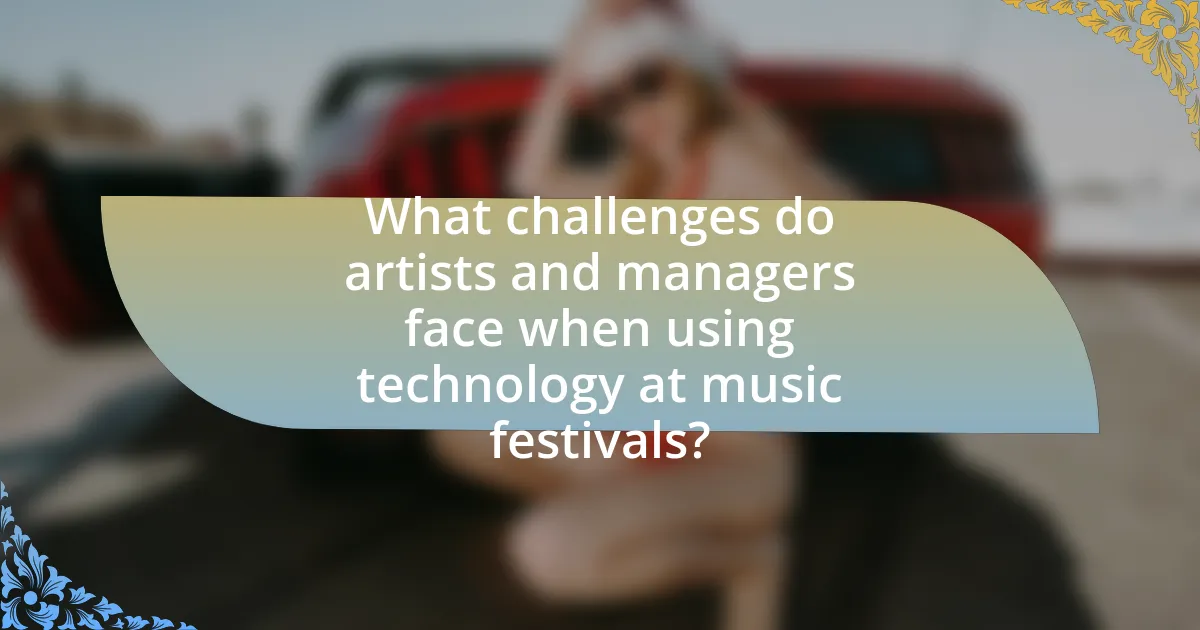
What challenges do artists and managers face when using technology at music festivals?
Artists and managers face several challenges when using technology at music festivals, including technical failures, data management issues, and communication barriers. Technical failures can disrupt performances and lead to delays, as seen in instances where sound systems or lighting equipment malfunction. Data management issues arise from the need to handle large volumes of information, such as set times and artist schedules, which can lead to confusion if not managed effectively. Additionally, communication barriers can occur due to reliance on technology for coordination, which may fail in high-traffic areas or during peak times, impacting the overall efficiency of operations. These challenges highlight the complexities of integrating technology into the fast-paced environment of music festivals.
What are the common technical issues encountered during music festivals?
Common technical issues encountered during music festivals include sound system failures, power outages, and connectivity problems. Sound system failures can arise from equipment malfunctions or inadequate setup, leading to poor audio quality or complete loss of sound. Power outages often disrupt performances and can be caused by insufficient electrical infrastructure or unexpected weather conditions. Connectivity problems, particularly with wireless communication devices, can hinder coordination among staff and artists, affecting overall event management. These issues are frequently reported in festival reviews and post-event analyses, highlighting their impact on the attendee experience and artist performance.
How can these technical issues affect artist performance and management?
Technical issues can significantly disrupt artist performance and management by causing delays, affecting sound quality, and leading to miscommunication. For instance, if sound equipment malfunctions, it can result in poor audio delivery, which directly impacts the audience’s experience and the artist’s ability to perform effectively. Additionally, technical failures can hinder the management team’s coordination, as they rely on technology for scheduling, communication, and logistics. A study by the International Journal of Event Management Research highlights that 70% of event managers cite technical difficulties as a primary concern that can lead to performance setbacks. This evidence underscores the critical role that reliable technology plays in ensuring smooth operations and successful artist performances at music festivals.
What solutions exist to mitigate these technical challenges?
Solutions to mitigate technical challenges in artist management at music festivals include implementing robust event management software, utilizing real-time communication tools, and adopting data analytics for decision-making. Event management software streamlines scheduling, logistics, and artist coordination, reducing errors and improving efficiency. Real-time communication tools, such as messaging apps, facilitate instant updates and coordination among team members, enhancing responsiveness to issues as they arise. Data analytics enables organizers to analyze audience preferences and operational performance, allowing for informed adjustments that enhance the overall experience. These solutions have been validated by case studies showing improved operational efficiency and artist satisfaction at major festivals.
How do privacy and security concerns impact technology use in artist management?
Privacy and security concerns significantly impact technology use in artist management by necessitating stringent data protection measures and influencing the choice of platforms for communication and collaboration. Artist managers must ensure that sensitive information, such as contracts, personal details, and financial data, is safeguarded against breaches, which can lead to reputational damage and legal repercussions. For instance, the implementation of GDPR in Europe mandates that organizations handling personal data must adopt robust security protocols, thereby affecting how artist management utilizes technology for data storage and sharing. Additionally, the rise of cyber threats has led to increased investment in secure communication tools and encrypted platforms, ensuring that artists’ and managers’ interactions remain confidential and secure.
What measures can be taken to protect artist data during festivals?
To protect artist data during festivals, implementing robust cybersecurity measures is essential. This includes using encryption for data storage and transmission, ensuring that all sensitive information is securely encrypted to prevent unauthorized access. Additionally, access controls should be established, limiting data access to only authorized personnel, thereby reducing the risk of data breaches. Regular security audits and vulnerability assessments can help identify and mitigate potential risks, ensuring that the festival’s data protection protocols remain effective. Furthermore, training staff on data protection best practices is crucial, as human error is often a significant factor in data breaches. These measures collectively enhance the security of artist data during festivals, safeguarding their personal and professional information.
How can technology providers ensure compliance with privacy regulations?
Technology providers can ensure compliance with privacy regulations by implementing robust data protection measures and regularly updating their privacy policies. These measures include conducting thorough data audits, employing encryption for sensitive information, and ensuring that data collection practices align with regulations such as GDPR and CCPA. Regular training for employees on privacy best practices and maintaining transparent communication with users about data usage further solidifies compliance. For instance, a 2020 report by the International Association of Privacy Professionals highlighted that organizations with comprehensive privacy programs are 50% more likely to avoid data breaches, underscoring the importance of proactive compliance strategies.
What best practices should be followed for effective technology use in artist management at music festivals?
Effective technology use in artist management at music festivals requires implementing a centralized management platform to streamline communication and logistics. This platform should integrate scheduling, artist requirements, and real-time updates to ensure all team members are informed and coordinated. Utilizing data analytics tools can enhance decision-making by providing insights into audience preferences and performance metrics, which can be used to tailor artist engagements and improve overall festival experience. Additionally, employing mobile applications for artists can facilitate direct communication with management, allowing for quick adjustments and feedback during the event. These practices are supported by the increasing reliance on technology in the music industry, where 70% of festival organizers report that technology significantly enhances operational efficiency and artist satisfaction.
How can artists and managers stay updated on the latest technological trends?
Artists and managers can stay updated on the latest technological trends by actively engaging with industry publications, attending technology-focused conferences, and participating in online forums and webinars. Industry publications such as Billboard and Music Business Worldwide regularly feature articles on emerging technologies in music. Conferences like South by Southwest (SXSW) showcase innovations and provide networking opportunities with tech leaders. Online platforms such as LinkedIn and specialized forums allow for real-time discussions and insights from peers and experts in the field. These methods ensure that artists and managers remain informed about advancements that can enhance their practices and improve festival experiences.
What resources are available for training in technology use for artist management?
Resources available for training in technology use for artist management include online courses, workshops, and industry-specific seminars. Platforms like Coursera and Udemy offer courses focused on digital marketing, data analytics, and project management tailored for the music industry. Additionally, organizations such as the Music Managers Forum provide workshops and networking opportunities that emphasize the integration of technology in artist management. These resources are designed to equip artist managers with the necessary skills to effectively utilize technology in their roles, enhancing their ability to manage artists in a rapidly evolving digital landscape.
